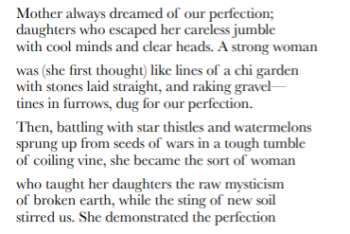Articles/Essays – Volume 47, No. 3
Celestial Terms | In the Night | Tangled Women
Celestial Terms
You love me in algebra—
D + d = L to the Nth degree,
and I love you in quarter notes—
a fierce appoggiatura and a soft, high C.
We loved each other then in
a jumble of chords using mostly black keys,
in square roots, and Pi with ice
cream, and the straining of infinity.
We passed my childhood in a
barrage of love-fear-grief-love—our Symphony.
When firmaments fell, you were
quiet. You held your anger safe from me.
At my wedding dance (neither
of us dances) we circled awkwardly,
and when I left the house for good
I looked up the long, steep length of driveway
and choked on my new freedom.
I couldn’t picture what my life would be.
And now, we tiptoe on the phone
(not our favorite). But then, last Christmas Eve
we debated math, Ron Paul,
and the theory of relativity,
and my poor husband went to bed
with a titan headache, like Sicily
invaded by the Romans.
But it is the inevitability
of you and me, the red-haired
inventor and blond pigtailed girl, hungering
for the best of what you could
(D+d) and could not quite give to me:
Someday we will share feelings.
In celestial terms they’ll zip, from heart to
heart, like electricity
elegant with algorithms, channeled in
raw-sung soliloquies.
In the Night
We slumber heavy in the night
so long as hills are bare and white
and what is real, is pressing. What
can you do but answer. What can
you do but take my jaw in hand
and answer. And what can I, but
know you while night visions press us, hot
in our down blanket. What cannot
be spoken, we will speak with night
still resting on us—your air
on me, and my warm shoulder bare
to you—real, real as day is light
until we wake in morning’s cold,
when mountains, rimming in the gold
of cresting sun, can no more be
deferred. What can we do but rise . . .
that I could stop you with my gaze
as you work your task of leaving me.
Tangled Women
Mother always dreamed of our perfection;
daughters who escaped her careless jumble
with cool minds and clear heads. A strong woman
was (she first thought) like lines of a chi garden
with stones laid straight, and raking gravel—
tines in furrows, dug for our perfection.
Then, battling with star thistles and watermelons
sprung up from seeds of wars in a tough tumble
of coiling vine, she became the sort of woman
who taught her daughters the raw mysticism
of broken earth, while the sting of new soil
stirred us. She demonstrated the perfection
of bulbs thrown, of planting in the pattern
of scatter. With closed eyes, she tossed her handful
in hope that we would all grow to be women
of choice. What renaissance—the perfection
of rebellion in us, tangled women.


 Back to full Issue
Back to full Issue

